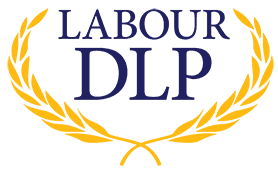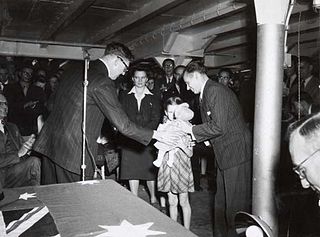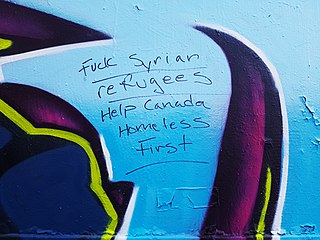Related Research Articles

Edward Gough Whitlam was the 21st prime minister of Australia, serving from 1972 to 1975. He was the longest-serving federal leader of the Australian Labor Party (ALP). He was notable for being the head of a reformist and socially progressive administration that extraordinarily ended with his removal as prime minister after controversially being dismissed by the governor-general of Australia, Sir John Kerr, at the climax of the 1975 Australian constitutional crisis. Whitlam is the only Australian prime minister to have been removed from office.

Harold Edward Holt was an Australian politician and lawyer who served as the 17th prime minister of Australia, from 1966 until his disappearance and presumed death in 1967, holding office as leader of the Liberal Party of Australia.

The history of Australia is the story of the land and peoples of the continent of Australia.

The White Australia policy is a term encapsulating a set of racist historical policies that aimed to forbid people of non-European ethnic origin – especially Asians and Pacific Islanders – from immigrating to Australia, starting in 1901, in order to create an Anglo-Celtic ideal. The policy also affected immigrants from Italy. Governments progressively dismantled such policies between 1949 and 1973.

The Democratic Labour Party (DLP), formerly the Democratic Labor Party, is an Australian political party. It broke off from the Australian Labor Party (ALP) as a result of the 1955 ALP split, originally under the name Australian Labor Party (Anti-Communist), and was renamed the Democratic Labor Party in 1957. In 1962, the Queensland Labor Party, a breakaway party of the Queensland branch of the Australian Labor Party, became the Queensland branch of the DLP.

Arthur Augustus Calwell was an Australian politician who served as the leader of the Labor Party from 1960 to 1967. He led the party through three federal elections, losing each one in turn.
White nationalism is a type of racial nationalism or pan-nationalism which espouses the belief that white people are a race and seeks to develop and maintain a white racial and national identity. Many of its proponents identify with the concept of a white nation.

The Division of Calwell is an Australian Electoral Division in the state of Victoria.
The immigration history of Australia began with the initial human migration to the continent around 80,000 years ago when the ancestors of Aboriginal Australians arrived on the continent via the islands of Maritime Southeast Asia and New Guinea. From the early 17th century onwards, the continent experienced the first coastal landings and exploration by European explorers. Permanent European settlement began in 1788 with the establishment of a British penal colony in New South Wales. From early federation in 1901, Australia maintained the White Australia Policy, which was abolished after World War II, heralding the modern era of multiculturalism in Australia. From the late 1970s there was a significant increase in immigration from Asian and other non-European countries.

Italian Australians are Australian-born citizens who are fully or partially of Italian descent, whose ancestors were Italians who emigrated to Australia during the Italian diaspora, or Italian-born people in Australia.

Uranquinty is a small town approximately 15 kilometres (9 mi) south of Wagga Wagga, in the Riverina region of New South Wales, Australia. The population of the town, often referred to as "Quinty", is 909.

Post-war immigration to Australia deals with migration to Australia in the decades immediately following World War II, and in particular refers to the predominantly European wave of immigration which occurred between 1945 and the end of the White Australia policy in 1973. In the immediate aftermath of World War II, Ben Chifley, Prime Minister of Australia (1945–1949), established the federal Department of Immigration to administer a large-scale immigration program. Chifley commissioned a report on the subject which found that Australia was in urgent need of a larger population for the purposes of defence and development and it recommended a 1% annual increase in population through increased immigration.

Opposition to immigration, also known as anti-immigration, has become a significant political ideology in many countries. In the modern sense, immigration refers to the entry of people from one state or territory into another state or territory in which they are not citizens. Illegal immigration occurs when people immigrate to a country without having official permission to do so. Opposition to immigration ranges from calls for various immigration reforms, to proposals to completely restrict immigration, to calls for repatriation of existing immigrants.
David Neng Hwan Wang, was a Chinese-Australian businessman and the first Chinese-Australian elected to the Melbourne City Council.
Indo-Fijians also known as Indian Fijians are Fijian citizens of Indian descent, and include people who trace their ancestry to various regions of India and the Indian subcontinent. Although Indo-Fijians constituted a majority of Fiji's population from 1956 through the late 1980s, discrimination and the resulting brain drain resulted in them numbering 313,798 (37.6%) out of a total of 827,900 people living in Fiji as of 2007.
Hungarian Australians are Australian citizens of Hungarian descent. The constant influx of Hungarian immigrants was marked by several waves. Most of the Hungarian immigrants to Australia came after World War II and after the Hungarian Revolution of 1956. Hungarian Australians mostly live in state capital cities. Responses to the 2006 ABS-conducted national census questionnaires could reflect the true numbers of Hungarian Australians only if one takes into account not only those born in Hungary. In addition to that, those of ethnic Hungarian origin born outside Hungary who officially and specifically identified themselves of Hungarian ancestry would total 67,616 Hungarian Australian persons, residents of Australia as per ABS tabulation under "Hungarian Ancestry" . The breakdown according to State and Territory was: NSW 23,577; VIC 21,727; QLD 9795; SA 5,427; WA 4,230; TAS 877; ACT 1,652; NT 331. Of the 67,616 total 20,166 or 29.82% were born in Hungary, 31,103 or 46% were aged 65 and over, 40,570 or 60% had tertiary or trade qualifications. In the same 2006 Census, among Hungarian-born persons, the religious affiliation was as follows: 72.9% declared Christianity, 11.8% declared no religion or atheism, 7.4% declared Judaism, 0.6% declared other religions and 6.6% did not answer the question.

Multiculturalism in Australia is today reflected by the multicultural composition of its people, its immigration policies, its prohibition on discrimination, equality before the law of all persons, as well as various cultural policies which promote diversity, such as the formation of the Special Broadcasting Service.
The Australian Labor Party split of 1955 was a split within the Australian Labor Party along ethnocultural lines and about the position towards communism. Key players in the split were the federal opposition leader H. V. "Doc" Evatt and B. A. Santamaria, the dominant force behind the "Catholic Social Studies Movement" or "the Movement".

Lorenzo Abrogar Gamboa was a Filipino-American man who was excluded from Australia under the White Australia policy, despite having an Australian wife and children. His treatment sparked an international incident with the Philippines.

The Jewish Labour Bund, more commonly known as the Jewish Labour Bund Melbourne, the Australian Bund, or simply the Bund, is the Australian wing of the Bundist movement. It was a member of the historical International Jewish Labor Bund. It was founded in 1928. The Bund is currently registered only in the state of Victoria.
References
- ↑ Colm Kiernan (1978). Calwell. A Personal and Political Biography, West Melbourne, Thomas Nelson, pp. 129-130. ISBN 0-17-005185-4
- ↑ Egon F. Kunz (1988). Displaced persons. Calwell's New Australians, Sydney, Australian National University Press. ISBN 0-08-034406-2
- ↑ James Jupp (ed.)(1988) The Australian People. An Encyclopedia of the Nation, Its People and Their Origins, North Ryde, NSW, Angus and Robertson, p.103. ISBN 0-207-15427-9
- ↑ Ainsley Symons (2013), "Jack Little: leader of the DLP," in Recorder (Australian Society for the Study of Labour History, Melbourne Branch), No. 278, December, p.3